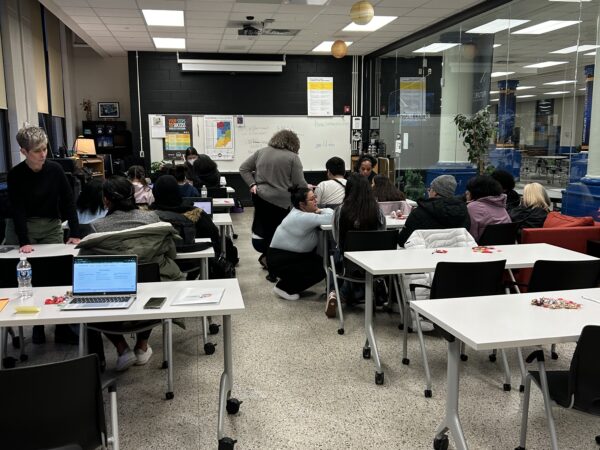The new 2024-2025 Free Application for Federal Student Aid, which is designed to simplify the process for applying for financial aid, became available on Dec. 30, 2023. The release of the new FAFSA coincides with 2023 Indiana legislation that requires high school seniors to file the FAFSA as a graduation requirement.
To support schools in implementing the new graduation requirement, the Richard M. Fairbanks Foundation awarded nearly $5 million in short-term grants to 37 Marion County public schools, four community organizations, and the Indiana Commission for Higher Education as a part of College Matters: Meeting the Moment. Grantees have been working diligently to provide resources and support to students and families as they file the FAFSA.
According to LaSaundra Alexander, college specialist with Escuelas públicas de Indianápolis, while they’ve faced some challenges with the new form – like a glitch that prevented parents without Social Security numbers from filing until late February – they’re doing everything they can to assist students and families. IPS is holding a series of events, partnering with community organizations like Invertido, el Liga Urbana de Indianápolis, and the Instituto Latino de Indiana for support. “I love that we have Indiana Latino Institute there to help provide translation for our Spanish-speaking families. That’s a huge help,” Alexander reported.
To encourage families to come out, IPS provides food at many of their events. They’re also using gift cards and college-going baskets filled with things like extra-long sheets for dorms as incentives. Alexander, whose position is grant-funded, says they’re thankful for Asuntos universitarios. “It’s very important to have funding for someone like me who can go into the schools and help students with all things college. The students need an extra person to talk to – to be a support – through this process.”
Krista Primrose, chief academic officer, and Cory Bess, postsecondary readiness manager, with Escuela secundaria politécnica de Purdue, were happy to report the new form is much quicker to complete. “The student portion now takes 15 to 20 minutes. The parent portion is a lot easier now too,” which is a significant improvement over the old form, Bess reported. Bess’ position is also grant-funded, enabling him to manage college readiness initiatives across all of Purdue Polytechnic’s campuses. He works with high school college and career managers to send out messaging, run events, and implement college readiness initiatives starting as early as ninth grade.
Primrose is optimistic about the new FAFSA completion requirement, especially in light of the Commission for Higher Education’s new pre-admissions initiative. “The increase of accessibility and attainability – I anticipate it’s going to move the needle toward postsecondary education in a really positive way. I think we’re right at a turning point, and it’s exciting to see,” she said.
Because the FAFSA launch was delayed, recent estimates say colleges will begin receiving students’ FAFSA data from the Department of Education in mid-March, which is later than usual. At that point, colleges will begin offering financial aid packages to prospective students. To help ease workload, the Department of Education announced they will relax certain requirements so colleges can better focus on these financial aid packages.



